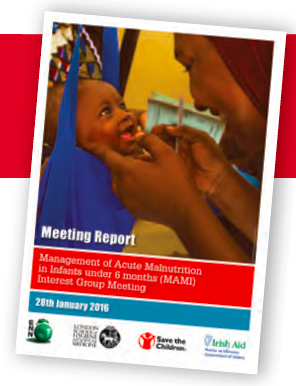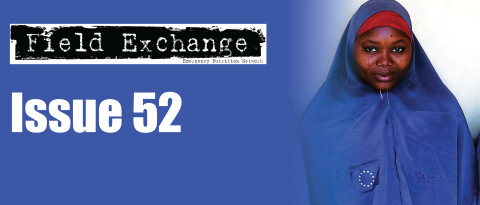MAMI Interest Group meeting
 On 27th January 2016, ENN, London School of Hygiene and Tropical Medicine (LSHTM) and Save the Children co-hosted a one day meeting of a Management of Acute Malnutrition in Infants under 6 months (MAMI) Interest Group1 in London. The meeting was funded by Save the Children (Margaret A. Cargill Foundation grant for forwarding Management of Acute Malnutrition in Infants research) and ENN (Irish Aid). Twenty-nine participants represented WHO, UNICEF, UNHCR, CDC, OFDA, DFID, NGOs (Concern, Goal, Save the Children, ACF, IRC), field-based researchers (Malawi, Kenya), research institutions (LSHTM, UCL, Wellcome Trust, University of Tampere, KEMRI, Fogarty International Centre, Aga Khan University), neonatal and obstetric health, and ENN.
On 27th January 2016, ENN, London School of Hygiene and Tropical Medicine (LSHTM) and Save the Children co-hosted a one day meeting of a Management of Acute Malnutrition in Infants under 6 months (MAMI) Interest Group1 in London. The meeting was funded by Save the Children (Margaret A. Cargill Foundation grant for forwarding Management of Acute Malnutrition in Infants research) and ENN (Irish Aid). Twenty-nine participants represented WHO, UNICEF, UNHCR, CDC, OFDA, DFID, NGOs (Concern, Goal, Save the Children, ACF, IRC), field-based researchers (Malawi, Kenya), research institutions (LSHTM, UCL, Wellcome Trust, University of Tampere, KEMRI, Fogarty International Centre, Aga Khan University), neonatal and obstetric health, and ENN.
The meeting was prompted to facilitate exchange of experiences, policy and research relevant to MAMI, to identify opportunities to engage with reproductive and neonatal health, to share planned activities, and to spotlight emerging research priorities in order that partners can mobilise resources to address these moving forward.
Three presentation sessions (background/epidemiology, interventions and linking and learning with others) were followed by group work to identify priority actions and research. Presentations and research priorities were reviewed to see if they contributed to the top 15 MAMI research questions identified in a 2015 Child Health and Nutrition Research Initiative (CHNRI) MAMI research prioritisation2, and the priority WHO research questions for this age group noted in the WHO Guideline on Updates on the Management of Severe Acute Malnutrition in Infants and Children released in 20133
Overview of presentations
A WHO update on the status of MAMI related guidance & training, reinforced important initiatives to engage with including an Integrated Management of Childhood Illness (IMCI) Strategic Review planned for early 2016.
Secondary analysis of DHS data identified risk factors for acute malnutrition in infants <6m as household sanitation, maternal education, maternal nutrition, domestic violence, antenatal care practices and early breastfeeding practices.
Operational research findings were shared from Bangladesh (Save the Children), Malawi (LSHTM) and Kenya (KEMRI clinical trial). An important research initiative currently being pursued is the Improved Breastfeeding Support to Treat Acute Malnutrition amongst Infants under 6 months (IBAMI) research, that is planned for inpatient and community (follow-up) settings in Kenya. It aims to experiment with different approaches of home-based counselling (intensive/less intensive), borrowing approaches from mother-to-mother community support groups, which are working well in Kenya, and bring these into the clinic setting. The aim is to try to optimise breastfeeding as far as possible and see outcomes result.
Experiences of integrating infant screening (using MUAC) and programme admissions into operational settings were shared by GOAL from Ethiopia and with GOAL’s GOAL’s multi-country Nutrition Impact & Positive Practice (NIPP) Circle project.
An updated review of SAM treatment national guidelines reflected that community-based management of malnutrition in infants< 6m is not yet reflected in national protocols (one exception out of 46 national protocols). An overview of the C-MAMI Tool was presented. This ENN/LSHTM led initiative involving a peer review group of practitioners and experts, developed as a simple, first step stop-gap to help operationalise the 2013 WHO guidance regarding community based management of uncomplicated infants <6m.
Synergies and common ground between MAMI and both the Every Newborn Action Plan and Intergrowth and INTERBIO-21st study emerged in presentations and discussion.
Ongoing body composition research in Ethiopia is taking a fresh look at anthropometric criteria, looking to improve understanding on relations between growth and disease risk through life. An emerging hypothesis from this work is that MUAC reflects growth (nutritional vulnerability) while WLZ more closely reflects nutritional status.
Priority actions and research
Top priorities identified were:
-
WHO should review the evidence base for the case definition of SAM in infants < 6m, with particular consideration to its association with the risk of death. Currently, weight-for-height (WHZ) is the sole anthropometric diagnostic criterion for SAM in children under 6 months. The possible use of MUAC and WFA and the need to keep WHZ as diagnostic criteria to identify high risk children should be critically reviewed. Existing evidence and further analysis of existing data could be made available to the review process. (MAMI CHNRI research priority 1).
-
Pilot of breastfeeding interventions that target SAM infants <6m. Piloting the C-MAMI tool was specified as a top priority. This supports the proposed IBAMI research. (MAMI CHNRI research priorities 3, 4, 7).
-
There is a large gap in knowledge and associated interventions around maternal nutrition. In the context of MAMI, investigation of the impact of maternal supplementation when pregnant and when lactating is a priority. (MAMI CHNRI research priority 28, 29).
-
More funding for MAMI research is needed; researchers are encountering significant challenges in securing adequate resources.
Second level priorities identified were:
-
Update guidance and protocols, with specific reference to case definitions (MAMI CHNRI research priority 1).
-
Research into recovery and outcomes amongst treated infants <6m, including post-discharge (Research need not identified in MAMI CHNRI).
-
Research into risks and benefits of early complementary feeding in the context of SAM infants aged 4-5 months (WHO priority research question; MAMI CHRNI research priority 58).
-
Research into the role of social / cash/ non-food, psychosocial support interventions in MAMI (MAMI CHRNI research priorities 20, 43).
The meeting report is available online and presentations are available on request. For more information, contact: Marie McGrath, ENN. Visit our website for MAMI updates.
Since 2015, a ‘MAMI’ thematic area has been operating on en-net to support those working with this age group. Visit ENN to view and participate in discussions.
References
1 The MAMI Interest Group is an informal network of researchers and practitioners involved in the care of nutritionally vulnerable infants under 6 months and their carers, coordinated by ENN.
2 Angood C, McGrath M, Mehta S, Mwangome M, Lung’aho M, Roberfroid D, et al. (2015) Research Priorities to Improve the Management of Acute Malnutrition in Infants Aged Less Than Six Months (MAMI). PLoS Med 12(4): e1001812. doi:10.1371/journal.pmed.1001812
3 WHO, 2013. Updates on the management of severe acute malnutrition in infants and children. Guideline.


